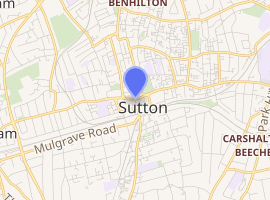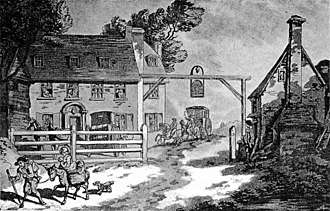The Cock sign
The Cock sign is a sign on the crossroads of Sutton High Street and Carshalton Road in the London Borough of Sutton. Built in 1907, it was originally a pub sign for The Cock hotel and pub, before being converted into a road sign and lamp post. Since 2018, The Cock sign has been a Grade II listed building.
| The Cock sign | |
|---|---|
The Cock sign | |

| |
| General information | |
| Location | Sutton High Street |
| Town or city | London |
| Country | England |
| Coordinates | 51°21′40.3″N 00°11′31.4″W |
| Construction started | 1907 |
| Relocated | c. 1915 |
| Height | 3 metres (9.8 ft) |
| Design and construction | |
| Architecture firm | Hart, Son, Peard and Co. |
Listed Building – Grade II | |
| Official name | The Cock sign on Sutton High Street |
| Designated | 18 April 2018 |
| Reference no. | 1450261 |
History

The Cock Hotel in Sutton was so named as London and Sutton were an historic centre for cockfighting.[1] It was on a main road from London to Brighton, and at one point in history, it was used as a post office.[1] The hotel was at one time owned by boxer John Johnson, also known as "Gentleman Jackson", who earnt the boxing title Champion of England.[2][3][4] In 1898, the original Cock Hotel was partially demolished so that the street could be widened.[2]
The Cock sign was built in 1907 by Hart, Son, Peard and Co.[2][5] It originally stood on a timber frame outside The Cock Hotel and pub on Sutton High Street.[2][3][5] When the hotel was completely demolished in 1914, the sign was moved to its present location on the crossroads of Sutton High Street and Carshalton Road.[3][6] In around 1915, The Cock sign was converted into a road sign.[7][8] At that time, the name of the hotel was removed from the sign.[3]
The Cock sign is on a 3-metre-tall (9.8 ft) column,[5] made out of steel and wrought iron.[2] Originally the sign had a gas-lit light, and two lanterns.[2] The light was later converted to use electricity, and the lanterns were removed before the sign was moved in 1915.[2][7] The fingerposts on The Cock sign point to Cheam, Worcester Park, Carshalton, Croydon, Banstead, Reigate, Mitcham, and London.[2] The road layout was changed in the late 20th century, but The Cock sign remained.[2] The crossroads where the sign stands is known as The Cock crossroads,[4] and is situated a few metres away from the location of The Cock hotel and pub.[2] In 2018, The Cock sign became a Grade II listed building.[7][8] It was one of three places in South London that Historic England listed in 2018.[8] In 2020, the sign was temporarily taken down for restoration work.[3]
References
- Morgan, J. (1869). "A History and Description of Sutton, Surrey, with a Directory of the Inhabitants: And Map, Showing All the New Roads". p. 4. Archived from the original on 8 June 2020. Retrieved 8 June 2020.
- "The Cock sign on Sutton High Street". Historic England. Archived from the original on 11 June 2020. Retrieved 7 June 2020.
- "Famous Sutton High Street cockerel sign to be restored". Sutton & Croydon Guardian. 11 March 2020. Archived from the original on 7 June 2020. Retrieved 7 June 2020.
- "Listed buildings: Bus shelter and cattle trough get listed status". BBC News. 20 December 2018. Archived from the original on 11 June 2020. Retrieved 7 June 2020.
- "From a thatched bus shelter to 'The Cock' - Historic England's most endearing newly listed buildings and structures". i. 21 December 2018. Archived from the original on 7 June 2020. Retrieved 7 June 2020.
- "Bus shelter and cattle trough join English heritage list". The Guardian. 20 December 2018. Archived from the original on 7 June 2020. Retrieved 7 June 2020.
- "Sutton's Giant Cock Sign Has Been Listed". Londonist. 20 December 2018. Archived from the original on 7 June 2020. Retrieved 7 June 2020.
- "Sutton High Street's The Cock sign gets Grade II status". Sutton & Croydon Guardian. 20 December 2018. Archived from the original on 7 June 2020. Retrieved 7 June 2020.